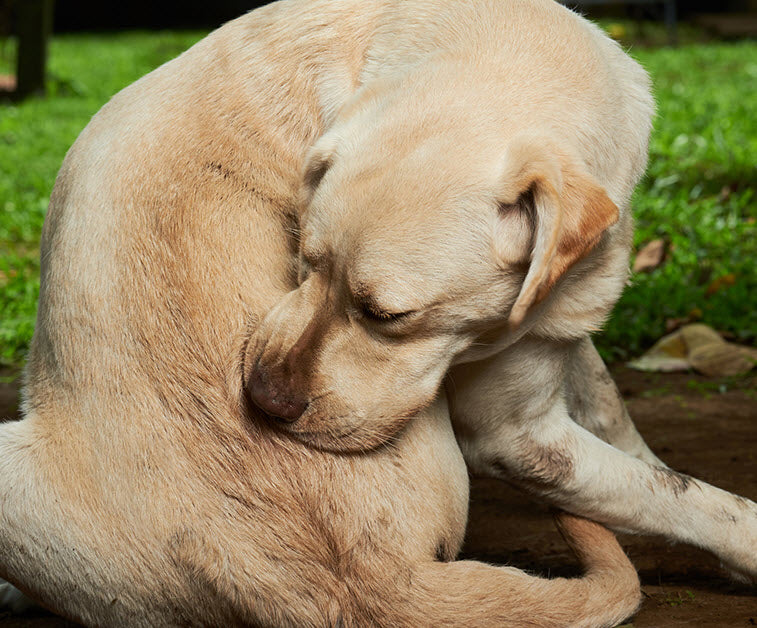Is your dog biting, scratching and chewing on himself more than ever? Could be that he is affected with seasonal allergies. Unlike humans who will sneeze or sniffle, dogs show signs of allergies through irritated and inflamed skin. Get to know the signs and what you can do to help your dog get the relief he needs.
Signs of Dog Allergies
The inflammation and irritation cause their skin to be very itchy, and they’ll do whatever they can to relieve this annoying feeling – biting, scratching, rubbing against furniture, rolling on the carpet, licking certain areas … whatever it takes!
As the scratching and biting continue to get worse, he may lose hair, create open sores and create hotspots. Hotspots are inflamed, infected sores that are generally red, very tender to the touch, can ooze pus, and can cause hair loss and bleeding.
Seasonal allergies often cause ear problems in dogs, making their ear canals become itchy and inflamed. Their ears can also become infected with bacteria and yeast. Signs that your dog has an ear infection are scratching at the ears, excessive shaking of the head, hair loss around the ears and a bad smell or discharge from the ears.
General redness can also be a sign of allergies. This can be just about anywhere, but watch for red puffy eyes, red belly and inner thighs, red paws, red muzzle, red base of the tail and red gums in his mouth.
Less common, but not unseen, are respiratory problems such as a runny nose, watery eyes, sneezing or coughing. Pets with seasonal allergies tend to be sensitive to pollens, grasses, ragweed, molds and other allergens that are inhaled. If a dog has a lung weakness, they can also develop sinus and bronchial infections.
What to Do?
One of the first things to look at is your dog’s diet. If your dog’s diet is high in carbohydrates, it can cause a lot of inflammation which can create or make your dog’s allergies worse. Transition to a diet that is low grain and potato free. Select a protein source that is less mass produced (chicken and beef) and more grass-fed such as venison or bison, or wild-caught such as salmon. Adding Omega-3 fatty acids can also help reduce inflammation. Good sources of these are krill oil, salmon oil, sardine oil and tuna oil.
It's important to keep your dog’s immune system running at top levels. Talk to your vet about which vaccines are absolutely necessary and which ones are optional. Avoid having your dog vaccinated during a flare-up, because this stimulates the immune system. Talk to your vet about testing your dog’s immunity to core diseases as an alternative to automatically vaccinating.
When your dog goes outside, he is picking up millions of allergens on his fur. It’s a good idea to rinse them off before coming in and walking them through a foot soak so they don’t bring the allergens inside your house. A foot bath should help reduce the amount of licking and chewing of his feet. Medicated shampoos are also a good idea, but avoid any with grains, such as oatmeal shampoos. Your veterinarian can recommend a good shampoo to use.
Keep your home as allergen-free as possible. Vacuuming, cleaning floors, cleaning your dog’s bed frequently and using non-toxic cleaning agents that contain harsh chemicals will help keep your dog’s allergens to a minimum. Also using an air purifier with allergy-specific filters is a great idea, as well as covering your dog’s bed with a dust mite cover so it can be frequently washed.
Related: Pet-Safe Cleaning Products
Talk to your vet to get his or her recommendation on any natural supplements they may recommend. Some vets use HistoPlex-AB, a blend of standardized herbal extracts, or Moducare to help modulate overactive immune systems. Eucalyptus oil can help to heal mucus membranes, and infusing the oil around your allergic dog has been shown to be beneficial.
Related: Are Essential Oils Safe for Dogs?
Another trend from humans is giving your dog locally produced honey. This honey contains small amounts of pollen from your area which can help your dog become less sensitive, over time, to the airborne allergens which trigger your dog’s allergic response. The best place to pick this up would be at your local farmers’ market.
Related: Raw Honey is Good For Dogs Too
Your vet may also recommend a series of allergy shots to help with desensitizing your dog. An alternative to giving them shots would be oral drops given under the tongue. These drops are derived from local allergens called RESPIT therapy (regionally-specific immunotherapy).
The more your dog is exposed to the allergens that he is sensitive to, the more long-lasting the allergic response will become. It’s important to address your dog’s allergies as soon as they appear, so they don’t continue to get worse from year to year.
This blog is brought to you by Under the Weather®, provider of a new product to bolster your dog’s immune system. Our Hemp Immunity soft chews will become available in mid-October. Under the Weather is also an avid supporter of finding homes for shelter dogs. We finance the Ruffy Rescue Transport Fund to cover the transport cost of bringing dogs from overpopulated kill shelters to Vermont for adoption. A portion of every dollar in sales is channeled to supporting this cause. Get to know more about Ruffy, the inspiration behind Under the Weather.
View Our Products.
Visit Our Blog Library.




